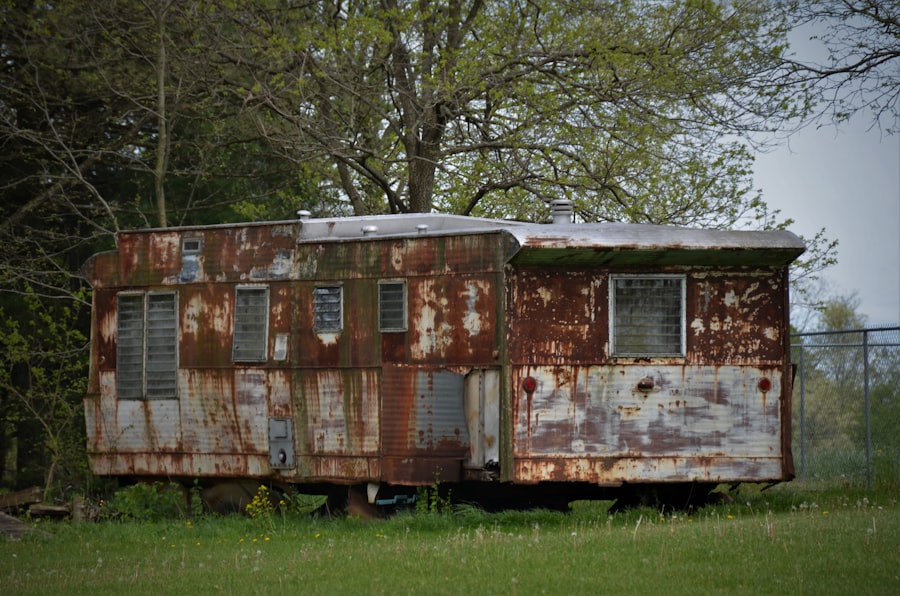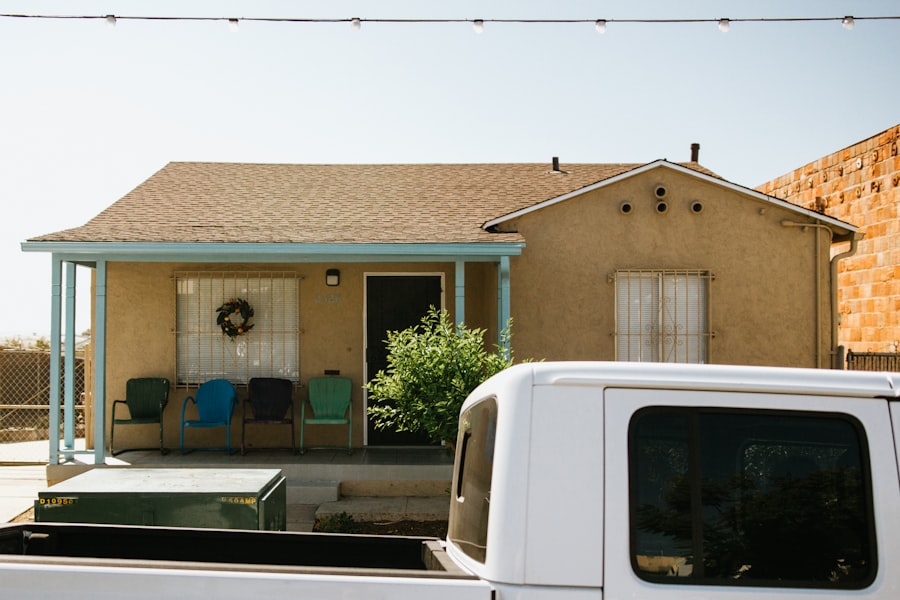Foreclosure mobile homes represent a unique segment of the real estate market, characterized by properties that have been repossessed by lenders due to the previous owner’s inability to meet mortgage obligations. Unlike traditional homes, mobile homes are manufactured structures that can be transported, offering a different set of challenges and opportunities for potential buyers. The foreclosure process for mobile homes can vary significantly from that of conventional houses, often involving specific legal and financial nuances that buyers must navigate.
Understanding these intricacies is crucial for anyone considering entering this market. The process of foreclosure typically begins when a homeowner defaults on their mortgage payments. In the case of mobile homes, this can occur in both park-owned and privately owned scenarios.
When a mobile home is foreclosed, it may be sold at auction or through a real estate agent, often at a price significantly lower than its market value. This presents an opportunity for buyers to acquire properties that might otherwise be out of reach. However, the condition of these homes can vary widely, and potential buyers should be prepared for the possibility of additional repairs or renovations.
Key Takeaways
- Foreclosure mobile homes offer affordable housing opportunities but come with unique risks and considerations.
- Thorough inspection and evaluation are crucial to avoid costly repairs and hidden issues.
- Financing options may vary, so exploring different lenders and loan programs is important.
- Effective negotiation can lead to better purchase terms and price reductions.
- Successful ownership requires understanding maintenance needs and community rules.
Advantages of Buying Foreclosure Mobile Homes
One of the most compelling advantages of purchasing foreclosure mobile homes is the potential for significant cost savings. These properties are often listed at prices well below their market value, allowing buyers to invest in a home without the financial burden typically associated with traditional real estate purchases. For instance, a mobile home that might normally sell for $50,000 could be available for as little as $30,000 in a foreclosure sale.
This price differential can make homeownership accessible to individuals and families who may not have the means to purchase a conventional home. Additionally, buying a foreclosure mobile home can provide an opportunity for investment. Many buyers choose to purchase these properties not only for personal use but also as rental units.
Given the lower initial investment, the potential for rental income can yield a favorable return on investment. For example, if a buyer acquires a mobile home for $30,000 and rents it out for $800 per month, they could see a substantial profit over time, especially when considering the relatively low maintenance costs associated with mobile homes compared to traditional houses.
Risks and Considerations When Purchasing Foreclosure Mobile Homes

While there are numerous advantages to buying foreclosure mobile homes, it is essential to recognize the inherent risks involved in such transactions. One significant concern is the condition of the property. Foreclosed homes are often sold “as-is,” meaning that buyers may inherit various issues ranging from minor cosmetic repairs to major structural problems.
For instance, plumbing or electrical systems may be outdated or damaged, requiring costly repairs that could negate any initial savings from the purchase price. Another critical consideration is the legal complexities surrounding mobile home ownership. Buyers must be aware of local zoning laws and regulations that govern mobile home parks and land use.
In some cases, purchasing a mobile home may not include the land it sits on, which can lead to additional expenses related to lot rental fees or restrictions on where the home can be placed. Furthermore, potential buyers should conduct thorough research on the title status of the mobile home to ensure there are no liens or encumbrances that could complicate ownership.
Finding Affordable Options for Sale
| Category | Average Price | Discount Range | Popular Platforms | Customer Rating |
|---|---|---|---|---|
| Electronics | 150 | 10% – 40% | Amazon, eBay, Best Buy | 4.2 / 5 |
| Clothing | 40 | 20% – 60% | ASOS, Zara, H&M | 4.0 / 5 |
| Home Appliances | 200 | 15% – 50% | Home Depot, Lowe’s, Walmart | 4.1 / 5 |
| Books | 15 | 5% – 30% | Amazon, Barnes & Noble, Book Depository | 4.5 / 5 |
| Furniture | 300 | 10% – 45% | IKEA, Wayfair, Overstock | 4.0 / 5 |
Finding affordable foreclosure mobile homes requires diligence and strategic searching. One effective approach is to work with real estate agents who specialize in foreclosures or have experience with mobile homes. These professionals can provide valuable insights into available properties and help navigate the complexities of the buying process.
Additionally, many online platforms list foreclosures, allowing buyers to filter searches based on price, location, and property type. Local government websites and housing authorities often provide resources for finding foreclosures as well. Many municipalities maintain lists of properties that have been foreclosed upon and are available for sale through public auctions or sealed bids.
Buyers should also consider attending foreclosure auctions in person, as this can provide opportunities to acquire properties at competitive prices while allowing them to assess the bidding environment firsthand.
Financing Options for Foreclosure Mobile Homes
Financing a foreclosure mobile home can differ significantly from securing a mortgage for a traditional home. Many lenders view mobile homes as personal property rather than real estate, which can limit financing options. However, there are still several avenues available for prospective buyers.
One common option is obtaining a chattel loan, which is specifically designed for financing manufactured homes that are not affixed to real estate. Another financing route involves seeking out specialized lenders who focus on mobile home loans. These lenders may offer more favorable terms and conditions tailored to the unique aspects of mobile home ownership.
Additionally, some government programs, such as those offered by the Federal Housing Administration (FHA), provide financing options for manufactured homes, making it easier for buyers to secure funding even with lower credit scores or limited down payment capabilities.
Inspecting and Evaluating Foreclosure Mobile Homes

Before finalizing a purchase, it is crucial to conduct a thorough inspection of any foreclosure mobile home under consideration. This step is vital in identifying potential issues that could affect both safety and livability. Buyers should consider hiring a professional inspector who specializes in mobile homes to assess structural integrity, plumbing systems, electrical wiring, and other critical components.
For example, an inspector may uncover hidden water damage or mold issues that could lead to significant repair costs down the line. In addition to professional inspections, prospective buyers should also perform their own evaluations during property viewings. This includes checking for signs of wear and tear on appliances, assessing the condition of flooring and walls, and ensuring that all systems are functioning correctly.
Buyers should also inquire about any previous repairs or renovations made to the home, as this information can provide insight into its overall condition and maintenance history.
Negotiating the Purchase of Foreclosure Mobile Homes
Negotiating the purchase price of a foreclosure mobile home can be a nuanced process that requires careful consideration and strategy. Buyers should begin by conducting thorough research on comparable sales in the area to establish a fair market value for the property in question. This information will serve as leverage during negotiations and help buyers avoid overpaying for their chosen home.
When negotiating with lenders or sellers of foreclosure properties, it is essential to remain flexible and open-minded. Many sellers may be motivated to close quickly due to their own financial situations, which can create opportunities for buyers to negotiate favorable terms such as reduced prices or seller concessions on closing costs. Additionally, presenting a strong offer with pre-approval from a lender can enhance a buyer’s negotiating position by demonstrating financial readiness and commitment.
Tips for Successfully Owning a Foreclosure Mobile Home
Successfully owning a foreclosure mobile home involves more than just completing the purchase; it requires ongoing management and maintenance to ensure long-term satisfaction and value retention. One key tip is to establish a regular maintenance schedule that includes routine inspections of critical systems such as plumbing, electrical wiring, and HVAC units. By proactively addressing minor issues before they escalate into major problems, homeowners can save significant time and money.
Another important aspect of ownership is understanding community regulations if the mobile home is located in a park or community setting. Familiarizing oneself with park rules regarding maintenance standards, noise ordinances, and property modifications can help prevent conflicts with neighbors or park management. Engaging with fellow residents can also foster a sense of community and provide valuable insights into best practices for maintaining and enhancing property value within the park.
In conclusion, navigating the world of foreclosure mobile homes requires careful consideration of various factors including advantages, risks, financing options, and ongoing management strategies. By approaching this unique market with informed diligence and strategic planning, prospective buyers can find affordable housing solutions while also positioning themselves for potential investment opportunities in this dynamic sector of real estate.



